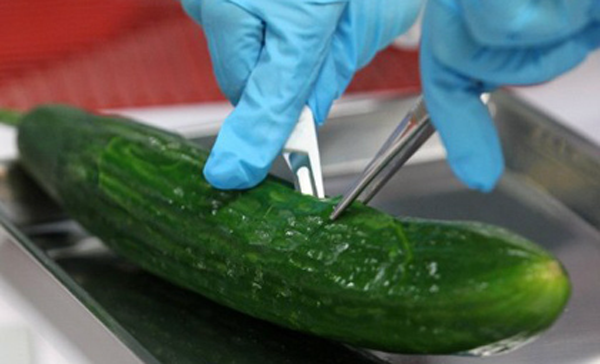Germany is the scene of an E.coli outbreak without precedent, that already took 18 lives, and caused more than 1600 people illness and severe kidney complications. According to media reports, the outbreak is caused by a never-seen before of E.coli (EHEC) O104 strain, a ‘new serotype’ – not previously involved in any E.coli outbreaks – similar to a strain that causes serious diarrhea found in the Central African Republic.

A biologist in Germany dissects a cucumber on May 30 over warnings that an outbreak of E. coli bacteria poisoning is still spreading some two weeks after the outbreak was first reported in the north of the country. (AFP)
Despite the fact that Germany blamed farms in Spain as the source, specifically cucumbers arriving in Hamburg from Málaga and Almería, researchers are still unable to pinpoint the food source of the illness. Spain demanded conclusive explanations and sufficient reparations from Germany, as the country’s fruit and vegetable exports had a lot to suffer since Germany pointed fingers at the farms in Spain, without any proof. Amidst the back-and-forth between the two countries, those who really have to suffer are the consumers.
The most affected area in Germany revolves around Hamburg and Northern Germany. So travelers visiting the region are advised to avoid eating raw vegetables at all costs. Many cases of patients infested with E.coli in other European countries have been linked to travel to Germany. According to preliminary genetic sequencing, the strain is a never before seen combination of two different E. coli bacteria, very resistant to treatments, and extremely aggressive. If infested, patients may develop severe kidney failure, and even lose their lives.
[…] As we previously reported, this is a new strain of E.coli, extremely resistant to antibiotics, and very aggressive. The strain has an eight-day incubation period, which means that the outbreak may not have reached its peak. If you travel to any of the following countries, avoid eating tomatoes, lettuce and cucumbers, which are believed to carry the disease. Ten countries have reported E.coli cases, including Germany, Britain, Sweden, Norway, Denmark, Austria, Spain, France, Switzerland, and Netherlands. […]